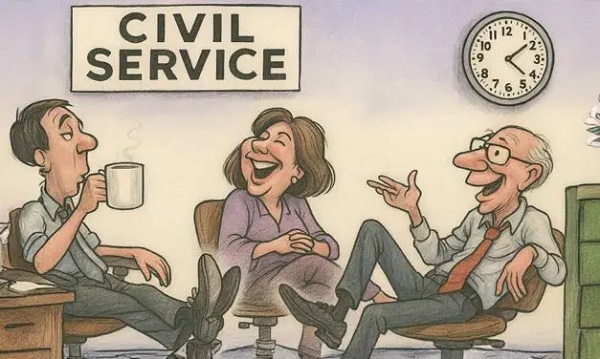Business
Bank of Canada Study Confirms Collapse in Consumer Confidence Amid Trade War Fallout

They chased applause at climate conferences while dismantling the industries that built this country. They ignored working Canadians, sabotaged our energy sector, and hollowed out our economic defenses in the name of “progress.”
A new Bank of Canada report, yes, that Bank of Canada, just confirmed what millions of working Canadians already feel in their bones: the economy is unraveling. Consumer sentiment, the baseline mood of the average Canadian family, has collapsed. And what triggered this historic plunge? Not inflation. Not interest rates. Not even Pierre Poilievre. No—it was Donald Trump.
According to the report, which was quietly released this month, it all started on February 1, 2025. That’s when former President Trump signed an executive order slapping massive tariffs on Canadian exports, steel, aluminum, energy, potash, lumber. You name it. Up to 35% tariffs. And then, because he’s Trump, he doubled down, casually suggesting in speeches that Canada should just become the 51st state. That’s not a joke. That’s annexation rhetoric.
And here’s the kicker, the numbers don’t lie. The Bank of Canada developed a new tool, the so-called CSCE Indicator, to measure consumer expectations. It tracked 2,000 households in real time, right as the trade war ignited. And what did they find? A total wipeout of all economic optimism from 2024. Jobs? Vanishing. Spending intentions? Cratering. Financial outlook? Bleak.
So here’s what we now know, and it’s not a guess. According to their latest report, Canadian consumer sentiment has collapsed. Not dipped. Not softened. Collapsed. Across the board.
They tracked three critical things: how people feel about their financial health, their job security, and whether they’re planning to spend money. Every single one fell off a cliff. The number of Canadians who believe they’ll be worse off financially next year? Surging. The odds that someone thinks they’ll lose their job? Skyrocketing—especially in regions that actually produce things, places that export goods, like steel, aluminum, and lumber. And major purchases? Cars, homes, furniture? Forget it. People aren’t buying. They’re holding their breath.
And here’s where it gets truly damning. This decline—this emotional and economic freefall—can’t even be explained by the usual suspects. Not inflation. Not unemployment. The Bank of Canada ran the numbers, built a full regression model, and what they found was a massive unexplained drop—a “residual” in economist speak. Translation: this isn’t about what’s happening right now. It’s about what people believe is coming next.
And what’s driving that fear? The answer is plain. A trade war launched by a former U.S. president, and public threats—threats—to annex Canada.
A very large portion of this crisis is the fault of the Liberal Party of Canada. That’s not a talking point—it’s a fact. It’s a fact backed by years of missed opportunities, ideological sabotage, and deliberate inaction by two successive Liberal regimes. And now the consequences have arrived, right on schedule.
Let’s be clear. This didn’t start with Trump’s tariffs. This started long before, when Justin Trudeau, and now his heir Mark Carney, decided that building energy infrastructure was just too messy, too politically inconvenient. For nearly a decade, the Liberals rejected every opportunity to make Canada energy independent. Northern Gateway? Cancelled. Energy East? Killed off. Teck Frontier? Abandoned after the government strangled it in red tape. Trans Mountain? Purchased with your tax dollars, then stalled into irrelevance. Every time a project came forward that could have helped this country get oil and gas to global markets, the Liberals caved to foreign-funded environmental groups and elite climate activists with Ivy League degrees and no skin in the game.
They had no vision—none—for a national energy corridor. They didn’t want one. A pipeline that could move Alberta crude to tidewater, or LNG from B.C. to the Atlantic, was dismissed as a relic of a bygone era. It wasn’t woke enough. Instead, they chose Paris climate targets, photo-ops with Greta Thunberg, and empty moral lectures at Davos. The result? When America decided to weaponize energy policy and slap tariffs on Canadian oil and gas, we had no fallback. No leverage. No global customers. Just bottlenecks and apologies.
And then there’s the LNG disaster. Remember when Deputy Prime Minister Chrystia Freeland said there was “no business case” for LNG on the East Coast? She wasn’t alone. Her former Natural Resources Minister, Jonathan Wilkinson, said the same thing. No business case. This, as Qatar signed over $60 billion in LNG deals with Europe. As the United States became the largest LNG exporter on Earth. As Germany, desperate for alternatives to Russian gas, pleaded with Canada to send help. We said no. Not because we couldn’t do it. But because the Liberals didn’t want to. It wasn’t aligned with their green ideology. It would offend the climate lobby. And so they let the opportunity pass.
And this—this is exactly what happens when you let a part-time drama teacher run a G7 country like it’s a college theater troupe. This is what Liberal governance looks like in practice: performative, reckless, and utterly disconnected from the real world. They chased applause at climate conferences while dismantling the industries that built this country. They ignored working Canadians, sabotaged our energy sector, and hollowed out our economic defenses in the name of “progress.”
And now? Now we’re supposed to hand the firehose to the very people who started the fire. The same elites who told us there was “no business case” for LNG. The same crowd who canceled pipelines, ignored warnings, and left us totally exposed to a geopolitical and economic assault.
It’s 2025. The country is staggering. And the architects of this collapse—the Trudeau-Carney Liberals—have the audacity to ask for our trust again. They want more time. More power. More control.
No. They’ve had a decade. They lit the match, doused the economy in kerosene, and now they’re pretending they smell smoke for the first time.
Canadians shouldn’t fall for it. We don’t need more empty virtue signaling. We need competence. Backbone. And leadership grounded in reality—not staged in front of a mirror.
Subscribe to The Opposition with Dan Knight .
For the full experience, upgrade your subscription.
Business
Labour disputes loom large over Canadian economy

From the Fraser Institute
By Fred McMahon
With labour disputes on the rise, Team Canada faces our greatest economic challenges in decades. It’s a bad look when team members jump the bench for the walk-out/lock-out penalty box—elbows up on the team, not on the ice.
Economic difficulties have escalated in recent years—miserable productivity growth, COVID and its inflation-drenched recovery, the uninvited U.S. trade war, and a government spending spree that left Canada deeply in debt and exacerbated all other difficulties.
Over the same period, labour disputes grew. Hours lost to disputes have been trending down for decades, but up since 2015. For the nine preceding years, the average hours lost annually was 224,000; for the nine years since, it’s been 190,000, but increasing over the years. In 2016, 74,000 hours were lost compared to 362,900 hours in 2023 and 293,600 last year.
Ironically, work stoppages typically occur only if they can wreck havoc on the Canadian economy. They hit sectors where customers and clients have little or no alternative. When customers have choices, they’ll walk away from a shutdown supplier. That encourages workers and businesses to figure out a solution before a strike.
Disputes in transportation and government services are particularly damaging. When Air Canada grounds flights, people and businesses already have tickets and plans. Options are limited and pricey. There is only one Port of Montreal. If it shuts down, there are no other Ports of Montreal. Cargo diversion is, well, limited and pricey. When government employees go on strike, people can’t turn to another government for service.
In 2023 and 2024, Canada suffered 62 transportation such work stoppages, including at the ports of Montreal and Vancouver, Canada’s two largest railways, and the St. Lawrence Seaway.
More disputes are on the way. Canada Post workers recently walked off the job hours after the federal government announced a major move from door-to-door delivery to community mailboxes. In British Columbia, civil servants are on the picket line. Public service unions are preparing to fight efforts to bring federal finances under control. And Air Canada and its flight attendants are now in arbitration after attendants rejected Air Canada’s most recent offer by 99.1 per cent.
As Keith Creel, CEO of Canadian Pacific Kansas City, wrote: “Canada’s message to the world is not one of efficiency, affordability and reliability. Lately, and repeatedly, it’s been the opposite: Disruptions. Delays. Diversions.” This is not a good for Team Canada when Canada needs new investment and entrepreneurship.
Everyone involved in a labour dispute loses. That means Canada losses. Air Canada says its recent strike, three-days long, cost the company $375 million. Employees and customers lose through foregone pay.
More than half a million passengers were directly affected, piling up the losses. Worse is the ripple affect on those not directly affected. When any part of the transportation network is impaired, business and people suffer. The economy is further damaged as investors become skittish about Canadian uncertainty, exacerbating economic difficulties.
Things may get worse. Canada’s economy is shrinking due to the trade war and our own economic mismanagement. That means there’s less stuff to go around. People’s pay on average has to shrink. The economy is not producing enough for everyone to make up “lost wages.” If all wages go up, the economy doesn’t magically start producing more. Instead, money buys less, inflation grows, economic damage intensifies, and there’s even less stuff to go around.
Resentment deepens as workers fight each other over the limited supply of stuff. Those who win make those who lose pay a disproportionate slice of the cost.
Three ways could eliminate or reduce these costs. One is to end unionization in government and essential services. Let the market decide wages. If pay is too low, employees leave for other opportunities, forcing employers to up pay. Another is to incentivize unions to resolve disputes before strikes, for example, by allowing replacement workers. The third is requiring mandatory arbitration, which has an admirable record in Canada of resolving disputes. Legislation should take into account reasonable complaints, whether employers or workers are favoured, and address them.
If Canada’s employers and unions can’t get their act together, only action will avoid dead-loss damage to the Canadian economy, leaving the rest of us as drive-by victims of labour bickering.
Business
Daily Caller EXCLUSIVE: Chinese Gov’t-Tied Network Training Illegal Immigrants To Drive Big Rigs In US
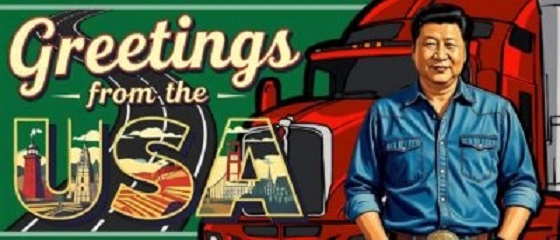

From the Daily Caller News Foundation
Chinese illegal immigrants are obtaining commercial driver’s licenses (CDL) and landing jobs in the U.S. trucking industry with support from a Chinese government-linked network, a Daily Caller News Foundation investigation discovered.
The Chinese American Trucker Organization USA Inc. (CATOU) is a New York-based nonprofit trade organization registered as a 501(c)6 that has allegedly helped over 1,000 Chinese students obtain CDLs and has a 100% pass rate, according to its business filings, social media posts and website. Videos posted on social media by an individual who crossed the U.S. southern border illegally shows they were able to rapidly obtain California CDLs after taking courses taught by CATOU instructors.
The public safety concern presented by truckers with unknown criminal backgrounds and driving records is compounded by CATOU’s board chairwoman, Geng Hang, who has held leadership roles within organizations operating as arms of the Chinese government and a Chinese Communist Part (CCP) influence and intelligence agency called the United Front Work Department (UFWD), according to DCNF translations of announcements from those entities.
“No way American citizens voted for the California gateway for illegal migrants to operate heavy vehicles throughout America. That of itself is a public safety and homeland security concern,” Steve Yates, senior research fellow for China and national security policy at the Heritage Foundation, told the DCNF.
“Having a large CCP-tied network further train, certify, and place ‘their’ illegal migrants throughout vital surface shipping routes — urban, rural, and interstate — elevates national security risks,” Yates said. “At a time of high tension, crisis, or conflict with the CCP, what confidence could we have this network could not and would not be used against us?”
CATOU and Geng did not respond to multiple requests for comment.

[Image created by DCNF with pictures from ASGCC and Qiaobao]
‘Not One Has Failed So Far’
Chinese social media posts show CATOU instructors teaching students about the trucking industry inside the New York office of Red Apple Employment Agency, which is also led by Geng, and helps Chinese nationals both with and “without proper status” find work for “$80 to $100 per job placement,” The Wall Street Journal reported in July 2024.
While the DCNF found no New York business filing for Red Apple Employment Agency, the agency’s office displays signs featuring both CATOU and its name, videos posted by CATOU on Chinese social media reveal.
CATOU members have also taught truck driving courses at 7 CDL Driving School in Manassas, Virginia, videos within posts from the X account @tiange999 show. The driving school shares its address with a trucking company that Geng owns called Red Apple Enterprises Inc., according to business filings and 7 CDL’s website.
“The driving school where I’m studying has trained over 1,000 Chinese students and not one has failed so far,” @tiange999 wrote in a September 2024 X post featuring videos filmed with a CATOU instructor at 7 CDL Driving School, according to a DCNF translation. “Experienced students can pass in just one week, while those with no driving experience pass in about a month.”
The @tiange999 account is operated by a Chinese national who traveled up from South America and Central America into North America before crossing the U.S. southern border in June 2023. The owner of the account has since referred to himself as someone who “walked the line,” which is a “euphemism for illegal migration out of China,” Simon Hankinson, senior research fellow at the Heritage Foundation’s Center For Border Security and Immigration, testified during a May 2024 hearing held by the House Committee on Homeland Security’s Subcommittee on Oversight, Investigations, and Accountability.
Roughly 8.5 million illegal aliens were encountered at the U.S. southern border during the Biden administration, including over 182,000 Chinese nationals from fiscal years 2021-2024, a spokeswoman for Customs and Border Protection told the DCNF.
The @tiange999 account also features videos detailing how he passed the CDL test at 7 CDL Driving School and ultimately obtained CDL qualification in less than two months after first announcing he’d received a California driver’s license in August 2024.
More recent posts show @tiange999 driving a coach bus with identification numbers revealing his employer to be NC Transfer Inc., which has branches in North Carolina and New York, according to business filings.
The Trump administration is ramping up scrutiny of the trucking industry following a deadly August 2025 crash in Florida involving an illegal immigrant truck driver with a California CDL, according to the Department of Homeland Security. The truck driver has been charged with three counts of vehicular homicide and a preliminary Department of Transportation (DOT) investigation allegedly discovered he “did not speak English.”
“I would say just the drivers alone is not scary enough on the national security front,” Justin Martin, a 15-year trucking industry veteran, told the DCNF.
“These guys are already here, and they’re already operating, and it doesn’t matter how many of these trucks you catch or how many of these drivers you shut down, they’re just going to get hired somewhere else until they start going after the companies and the owners of these companies and shutting them down and preventing them from coming back,” Martin said.

[Image created by the DCNF with screenshots of @tiange999’s X account]
‘Foreign Actors’
CATOU’s chairwoman, Geng, has served as an official in multiple organizations advancing Chinese influence and intelligence efforts in the U.S., including one entity that has held meetings in the New York office shared by CATOU and Red Apple Employment Agency, according to DCNF translations of Chinese media reports, social media posts, and the organizations’ announcements.
Among other Chinese government-tied leadership positions, the website of a New York nonprofit called the American Shaanxi General Chamber of Commerce (ASGCC) identifies Geng as its deputy chairwoman, according to a DCNF translation. ASGCC operates as a branch of the Shaanxi provincial Department of Commerce as well as a “sister association” of a UFWD arm called the China Overseas Friendship Association (COFA), according to DCNF translations of ASGCC and COFA announcements.
ASGCC has repeatedly met with Chinese government officials, including in June 2009, when the nonprofit welcomed a delegation from the Shaanxi government and the UFWD‘s Chinese People’s Association For Friendship With Foreign Countries to discuss U.S. investment in China, according to DCNF translations of ASGCC announcements. Geng presented the delegation’s head with flowers at the airport, and she and other ASGCC members later serenaded the officials with songs like “Nanniwan,” which commemorates the CCP and Chinese military, according to Chinese state media.
Photos accompanying a January 2015 social media post made by ASGCC’s chairman also show ASGCC has held meetings within the shared New York office of CATOU and Red Apple Employment Agency.
“We are slowly giving over our entire truck industry to foreign actors,” Gord Magill, a truck industry writer, told the DCNF.
“I think foreign actors are fully aware that America’s corporations engaging in wage arbitrage and wage suppression against their own people are presenting opportunities for them to extract and scrape value out of the U.S. and give them some kind of strategic advantage in knowing exactly how our transportation systems work, and they’re just leveraging it for their own ends at the cost of American jobs and American motorists’ safety,” Magill said.
ASGCC, Red Apple Employment Agency, 7 CDL Driving School, Red Apple Enterprises, @tiange999, NC Transfer Inc. and DOT did not respond to multiple requests for comment.
-
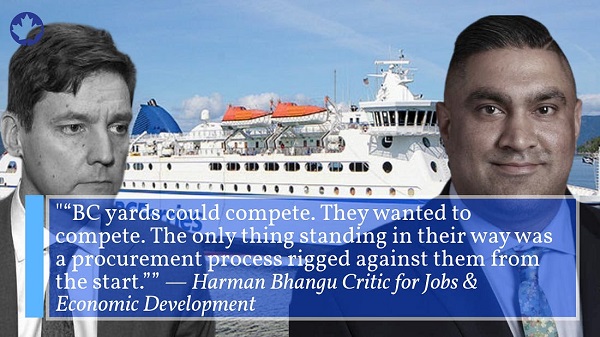
 Business1 day ago
Business1 day agoJobs Critic says NDP government lied to British Columbians and sold out Canadian workers in billion dollar Chinese ferries purchase
-

 Alberta1 day ago
Alberta1 day agoJason Kenney’s Separatist Panic Misses the Point
-

 Automotive23 hours ago
Automotive23 hours agoBig Auto Wants Your Data. Trump and Congress Aren’t Having It.
-
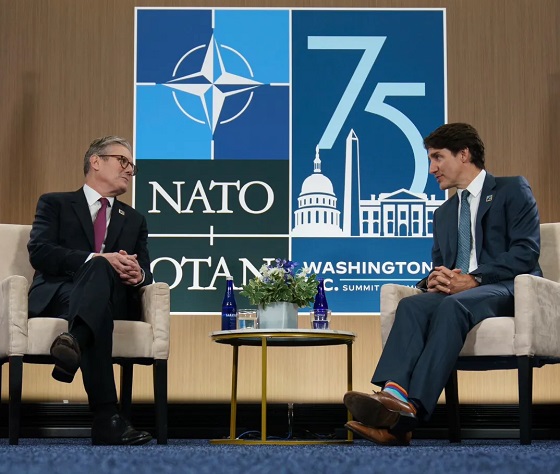
 espionage12 hours ago
espionage12 hours agoStarmer Faces Questions Over Suppressed China Spy Case, Echoing Trudeau’s Beijing Scandals
-
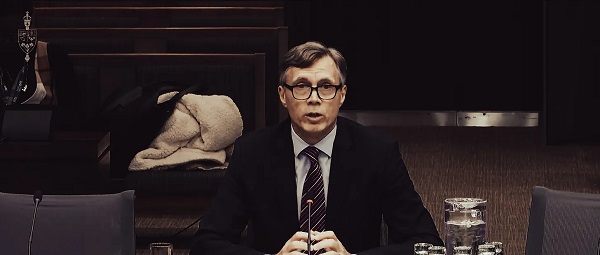
 Business1 day ago
Business1 day agoDemocracy Watch Drops a Bomb on Parliament Hill
-

 Business3 hours ago
Business3 hours agoLabour disputes loom large over Canadian economy
-

 Business3 hours ago
Business3 hours agoDaily Caller EXCLUSIVE: Chinese Gov’t-Tied Network Training Illegal Immigrants To Drive Big Rigs In US
-

 Energy2 hours ago
Energy2 hours agoOttawa must eliminate harmful regulations to spur private investment in pipelines








